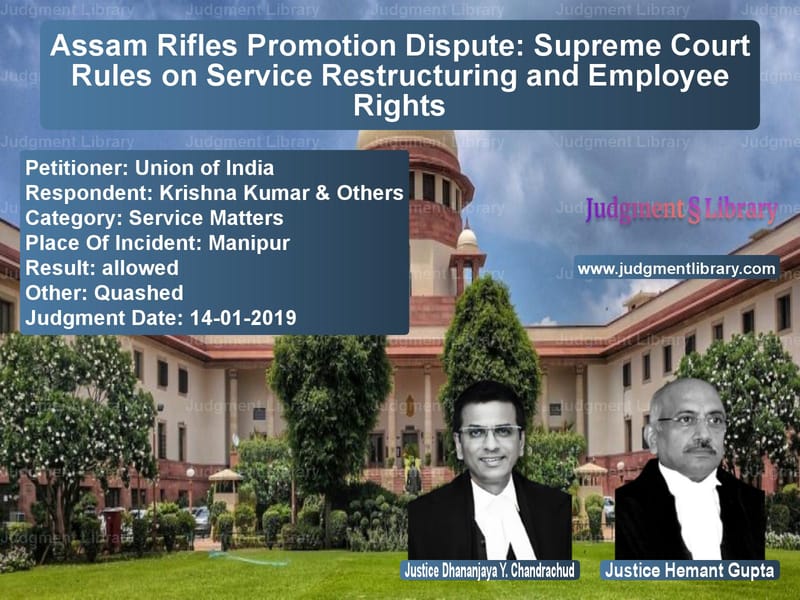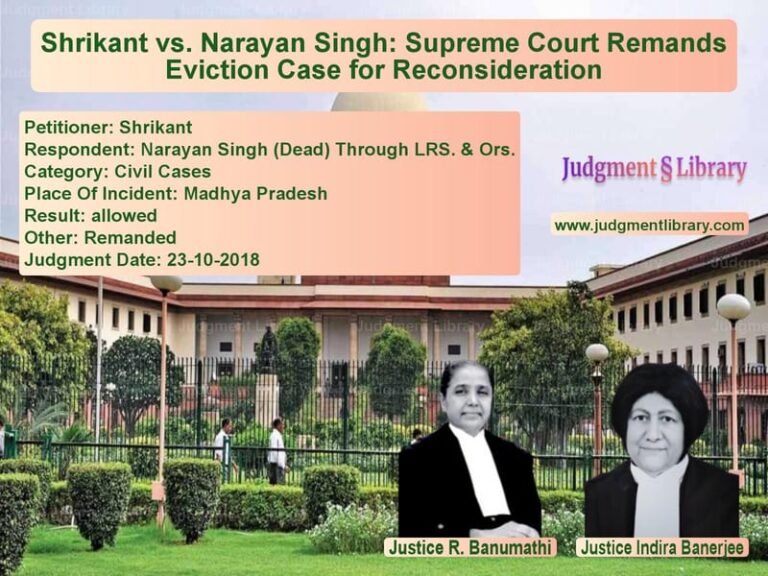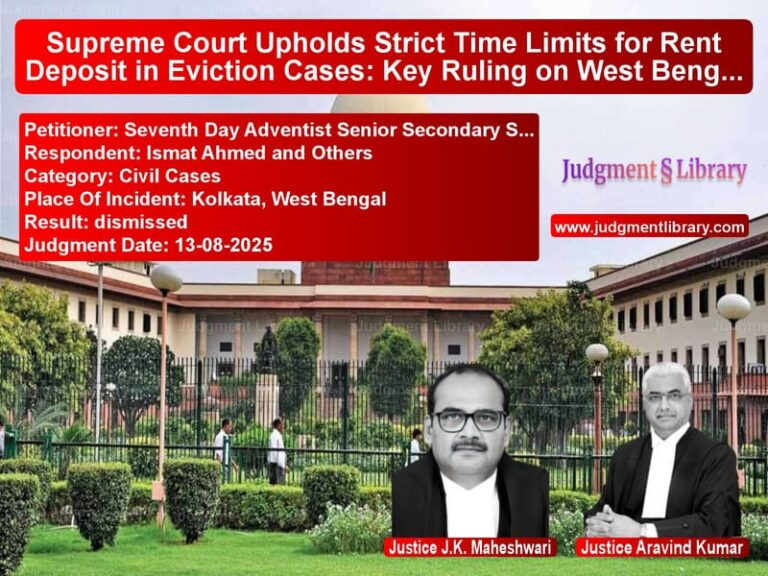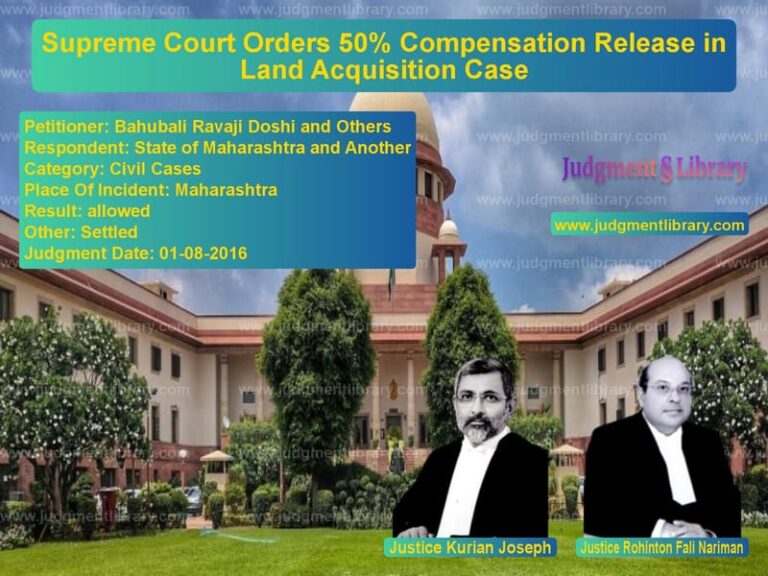Assam Rifles Promotion Dispute: Supreme Court Rules on Service Restructuring and Employee Rights
The Supreme Court of India, in the case of Union of India vs. Krishna Kumar & Others, addressed a significant issue concerning the restructuring of Assam Rifles and its impact on promotion policies. The case examined whether Havildars in Assam Rifles had a right to be considered for promotion to Naib Subedar based on old rules before the introduction of an intermediate rank of Warrant Officer. This judgment has far-reaching implications on service rules, employee rights, and administrative restructuring in armed forces and government organizations.
Background of the Case
The respondents in this case were appointed as Riflemen in Assam Rifles between 1982 and 1989. Over the years, they were promoted to the rank of Havildar, with the next step in their career progression traditionally leading to the rank of Naib Subedar.
However, in 2011, following the recommendations of the Sixth Pay Commission, the government restructured the ranks in Assam Rifles. This restructuring led to the introduction of a new intermediate rank – Warrant Officer – which was placed between Havildar and Naib Subedar. Subsequently, the Assam Rifles Warrant Officer (General Duty) Group ‘C’ Recruitment Rules, 2012, were notified.
The respondents were promoted as Warrant Officers in 2012 but argued that they should have been considered for promotion to Naib Subedar based on vacancies that existed before 2011. They contended that the restructuring unfairly deprived them of their expected career progression. Seeking relief, they filed a writ petition in the High Court of Manipur, which ruled in their favor and directed the authorities to consider their promotions to Naib Subedar against pre-2011 vacancies.
Petitioner’s Arguments (Union of India)
- The restructuring of Assam Rifles was a well-planned administrative decision aimed at improving operational efficiency and career progression.
- At the time of consideration, the applicable rules mandated promotion to Warrant Officer, not directly to Naib Subedar.
- Employees do not have a vested right to promotion but only the right to be considered under the rules prevailing at the time.
- The High Court erred in applying old rules to pre-2011 vacancies despite structural changes in Assam Rifles.
- The introduction of Warrant Officer was necessary to maintain hierarchical discipline and smooth career progression within the organization.
Respondent’s Arguments (Krishna Kumar & Others)
- Since the restructuring occurred in 2011, it should not have affected vacancies that arose before the implementation of the new system.
- The respondents had a legitimate expectation of being promoted to Naib Subedar as per the service conditions existing at the time of their eligibility.
- Imposing an additional rank between Havildar and Naib Subedar was arbitrary and adversely affected their career prospects.
- Applying the new rules retrospectively violated their rights under Articles 14 and 16 of the Constitution, which guarantee equality in employment.
Supreme Court’s Judgment
The Supreme Court, led by Justices Dr. Dhananjaya Y. Chandrachud and Hemant Gupta, ruled in favor of the Union of India, overturning the High Court’s decision. The Court made several critical observations:
- No Vested Right to Promotion: The Court reaffirmed that government employees do not have a vested right to promotion but only a right to be considered under the rules prevailing at the time of promotion.
- Validity of Restructuring: The introduction of an intermediate rank of Warrant Officer was a legitimate administrative decision that did not violate any fundamental rights.
- Application of Existing Rules: The Court emphasized that the promotions must be governed by the rules in force at the time of consideration, not by past rules.
- Precedents on Promotion Rules: The Court cited Y.V. Rangaiah vs. Sreenivasa Rao and Deepak Agarwal vs. State of Uttar Pradesh, holding that vacancies do not necessarily have to be filled under old rules if new rules have been implemented.
- Fair Implementation: The restructuring did not disadvantage the respondents unfairly, as it created new opportunities for career advancement.
Observations from the Judgment
The Supreme Court extensively referenced past cases and legal principles to support its decision. The Court noted:
“There is no universal rule that vacancies must be filled under the old regime. The right to be considered for promotion is governed by the rules prevailing at the time of promotion.”
Additionally, it observed:
“The restructuring exercise in Assam Rifles introduced an intermediate rank, and promotions thereafter had to be made under the new framework.”
The ruling effectively dismissed the argument that old vacancies must be filled under old rules, reinforcing the principle that government restructuring is a valid administrative function.
Impact of the Judgment
This decision sets a precedent in employment law, particularly in cases involving service restructuring in government and military organizations. The key takeaways from this judgment are:
- Government authorities have the right to restructure services to improve efficiency and effectiveness.
- Employees cannot claim automatic promotions under past rules once new regulations come into effect.
- Administrative decisions must balance organizational needs with fairness to employees, but courts cannot mandate promotions based on outdated criteria.
- The ruling ensures that promotions in government services remain aligned with evolving administrative structures and requirements.
Conclusion
The Supreme Court’s ruling in this case clarifies the legal position on service restructuring and promotions in government organizations. It establishes that employees must adhere to the rules in force at the time of their promotion and that legitimate administrative decisions cannot be challenged merely based on past expectations.
By upholding the restructuring of Assam Rifles and denying the retrospective application of old promotion rules, the Court has reinforced the importance of dynamic service regulations. This judgment serves as an essential reference for future cases involving employment policies in military and government institutions.
Petitioner Name: Union of India.Respondent Name: Krishna Kumar & Others.Judgment By: Justice Dhananjaya Y. Chandrachud, Justice Hemant Gupta.Place Of Incident: Manipur.Judgment Date: 14-01-2019.
Don’t miss out on the full details! Download the complete judgment in PDF format below and gain valuable insights instantly!
Download Judgment: Union of India vs Krishna Kumar & Othe Supreme Court of India Judgment Dated 14-01-2019.pdf
Direct Downlaod Judgment: Direct downlaod this Judgment
See all petitions in Promotion Cases
See all petitions in Public Sector Employees
See all petitions in Recruitment Policies
See all petitions in Judgment by Dhananjaya Y Chandrachud
See all petitions in Judgment by Hemant Gupta
See all petitions in allowed
See all petitions in Quashed
See all petitions in supreme court of India judgments January 2019
See all petitions in 2019 judgments
See all posts in Service Matters Category
See all allowed petitions in Service Matters Category
See all Dismissed petitions in Service Matters Category
See all partially allowed petitions in Service Matters Category







